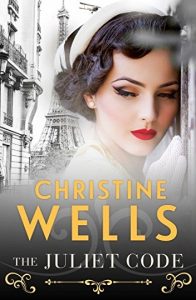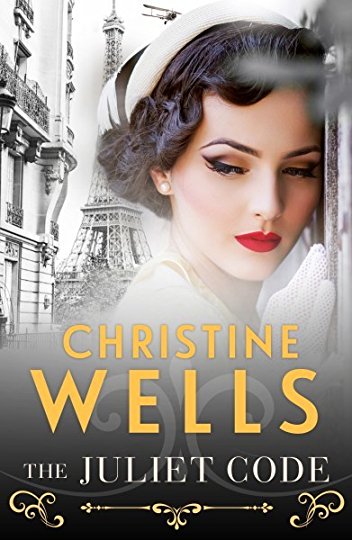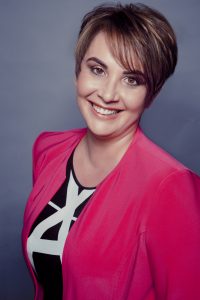Today I warmly welcome Christine Wells to Sunday Spotlight, here to talk about writing, reading, and her latest historical fiction release, The Juliet Code.
When did you start writing and what was the catalyst?
I always loved creative writing at school but the demands of study and a legal career took me away from writing for pleasure for a while. Not because I didn’t want to do it, but because I knew that once I started, writing would probably consume me. I am an all or nothing kind of person.
One day, while I was working as a solicitor, I noticed that the Queensland Writers Centre was offering a workshop and I went along. Now, when most of our favourite authors are on social media, it’s easy to forget that once upon a time, real, live novelists were not at very accessible. I was fascinated by this author who had come to teach us about writing crime. I hadn’t heard of her before (this was in the late nineties, I suppose) but she was a lawyer, like me, and she had written feminist retellings of ancient Greek myths, as well as a couple of detective novels starring a gutsy, sexy sleuth called Phryne Fisher…
I did begin writing then, and it did consume me. I had been right about that. A couple of years later, I quit my job to write full-time.
How many novels have you written and published?
I have written 14 novels and published 13.
How long on average does it take you to write a book?
I am always researching the next book while working on the previous one, but I have about 9 months between proposal and deadline. About 70% of the actual writing is usually done in a white-hot heat about 3 months out from deadline. I would like to change this process very much and do not recommend it to anyone!
How has being Australian AND a woman impacted on your writing and/or writing career?
When I started writing, Australian publishers did not publish much historical fiction that wasn’t set in Australia. This was before Kate Morton hit the scene. My first 10 novels were published in New York. After the Australian rights to my U.S. books sold to Penguin here, I got to know an editor I loved working with at Penguin and then I sold her my historical novel, The Wife’s Tale. I find that being Australian isn’t a barrier to selling overseas, but if you set a book here, you had better be Liane Moriarty or Jane Harper. The bar is a lot higher because they see an Australian setting as a negative thing in the U.S. Perhaps less so elsewhere, but in the UK, you run into trouble if you have already sold Australian rights because they consider Australia to be their territory.
As for being a woman… I had a three-year-old son and was 7 months pregnant with my second son when I sold my first book. In one way, I am very grateful that the flexible hours have allowed me more time with my children. However, it is not easy being a stay-at-home mother of young children while writing to deadline—and New York editors are far less forgiving than Australian ones. They don’t like giving extensions because there’s an entire production schedule that depends on the author hitting the deadline. There are thousands of authors ready to take your place if you don’t deliver and publishers drop authors all the time. You have to be utterly obsessed and focused and determined not to let anything stand in your way, but you also have to remember that at the end of the day, your children come first. It’s a tough balancing act.
What authors and types of books do you love the most?
I love historical fiction, of course. The Thirteenth Tale by Diane Setterfield, Kate Atkinson’s Life After Life, and Katherine Webb’s wonderfully gothic historicals are favourites as well as Code Name Verity by Elizabeth Wein. Kate Forsyth writes gorgeous fairy-tale inspired historical novels that you can just sink into and revel in the beautiful language. In romance, I love Georgette Heyer, Anna Campbell, Loretta Chase and Jenny Crusie. I’m a big fan of crime and thriller as well: I think John Le Carré is a genius and I never miss a book from Lisa Gardner or Gillian Flynn. And then there are classics I re-read every few years, like Austen’s novels, The Odyssey, Vanity Fair, Tom Jones, Queen Margot, Wuthering Heights, A Tale of Two Cities… I could go on and on!
What is your favourite childhood book? Did reading as a child have any bearing on your decision to become a writer?
I adored Geoffrey Trease’s wonderful historical novels, Frances Hodgson Burnett’s The Little Princess and The Secret Garden and of course, the Anne of Green Gables books as well. I was such a bookworm, I read constantly, so that must have led to becoming a writer, but at the time I thought authors were god-like creatures. I never thought to aspire to become a novelist until I was in my twenties and even then, it seemed a distant dream.
What inspired your most recent book?
I think more than any other of my novels, The Juliet Code was inspired by real people and events. I had been researching British agents who parachuted into occupied France during WWII for The Traitor’s Girl and I came across the tragic story of the agent Noor Inayat Khan, who was generally a gentle soul but fiery with the need to stop the Nazis. She was a very good wireless operator but she wasn’t anyone’s idea of a secret agent (she was frightened by gunfire, for example, and had a hard time with the idea that she might have to tell lies in the course of her war work.) In fact, Leo Marks, who was in charge of decoding wireless transmissions from agents in France, was so worried about her need to tell the truth, he gave her a special security check to use in case she was captured and forced to continue transmitting false intelligence back to headquarters by the Germans.
Despite concerns about Noor’s abilities, she was sent to France, and she managed to evade capture and work effectively in Paris until she was betrayed to the Germans, taken to a luxurious mansion in Paris’s Avenue Foch, and interrogated. She attempted escape many times and fought her captors so viciously, they labelled her a dangerous prisoner. I thought, what if my protagonist is this kind of underdog—no one thinks she can do it–but she survives? The Juliet Code sprang from that idea.
How much research do you do? As an author of Historical Fiction, how do you balance the demands of getting the facts right and telling a good story?
I spend months researching each of my historical novels. I usually decide it’s time to stop when most of the new material I’m reading has information I already know from somewhere else. I immerse myself in the period in other ways, reading novels that were published in the era, watching documentaries, movies, even Youtube videos on things like how to load and fire a flintlock pistol or how to operate a WWII wireless set. The movies aren’t often accurate but they help establish an atmosphere or a feeling and can even trigger further research. I like to visit the places I write about, too. I find the most valuable time to do this is after the first draft. Then you can pinpoint exactly what you need to know and give your scenes more colour and authentic detail.
As for the facts, if I do deliberately change something, I will explain that in an author’s note. I try to be as accurate as possible, but in the end, telling a good story is my primary aim. I used to hyperventilate at the thought of getting the most minor detail wrong, but very occasionally, you don’t know what you don’t know and don’t even think to research the etymology of a particular word, for example. Hopefully any errors will be caught by a copy editor or my very knowledgeable critique partner. But I feel that every writer of historical fiction has to find a level of accuracy they are comfortable with. There is no such thing as absolute accuracy when it comes to history, anyway.
Do you read your book reviews? Do you appreciate reader feedback and take it on board, even if it is negative? How do you deal with negative feedback after spending so much time writing your book?
I do appreciate every review I receive although I don’t read all of them. It is a very special thrill when a reader really gets what you were trying to do in your work. For example, all my novels have strong feminist themes and I love when a reviewer recognises that.
I don’t change anything based on reader reviews. That way, madness lies. People so often have completely conflicting views, you’d go crazy trying to please everyone. Criticism doesn’t bother me at all. Everyone is entitled to their opinion. What does irk me is a one star slapped on a book that isn’t even handed in yet. That’s just malicious.
How much planning do you do? Do you plan / plot the entire story from beginning to end, or let it evolve naturally as the writing progresses? In terms of characters, are they already a firm picture in your mind before you start writing or do they develop a personality of their own as the story progresses?
I am naturally an organic writer. When I started writing, it would completely kill my interest and passion for the story to plan a book ahead of time. I would know the central conflict and have a few key scenes in mind, but that was it. Even when I had to write a synopsis for editors, the only way I could do it was to tell myself it was all a lie and they wouldn’t reject the finished product if it didn’t at all resemble the synopsis.
I have tried very hard to be more of a plotter because it is a more efficient way to write. However, I find that the way to do it for me, is to plot out the steps of the hero’s journey, write the synopsis, then forget about all of that as I write. That way, I still feel the freedom to write ‘into the mist’ as they say, but if I am stuck at any point, I can refer back to my plan. Strangely, when I’m finished the book, the plot bears a fairly close resemblance to my original synopsis (although my protagonist in THE JULIET CODE insisted on falling in love with the wrong man, so that complicated matters!)
I have always found character interviews and fact sheets a complete waste of time although I understand they are useful for some writers. I know who my character is when she or he starts talking and reacting to conflict in the story itself. Somehow, I know them as soon as they start talking. I don’t have to write my way into them and go back and change things earlier in the story to fit with who they become later. For me, writing characters is like acting, I have to inhabit them to know what they will do in a given situation.
Have you ever had to deal with a situation where someone feels they recognise traits of themselves in one of your characters?
I steer clear of writing about people I know, but someone once said to me that my protagonists’ mothers are often evil or dead and I realised I don’t write nice mothers because then my own mother might think I was writing about her!
Can you tell us something about yourself that not many people would know?
My father is also a writer who has published several books on the history of Rugby and cricket.
If you could go back in time for a year, which historical era would you choose to live in?
Since writing The Wife’s Tale I’d choose the Georgian era, before the French revolution, when there was so much reform work going on in Britain and so much discussion about the rights of both men and women. On the proviso that I would be a woman of independent means, of course! No one wants to be a scullery maid, do they?
If you could sit down for an afternoon with an iconic person from history, who would you choose to spend that time with?
Very tough to choose just one, and I do think I would feel intimidated by most of my historical heroes, but I’d love to chat with Mary Wollstonecraft and talk about what has changed since she wrote A Vindication of the Rights of Woman and what has not.
When did you discover the Australian Women Writer’s Challenge? Do you think the challenge has had any impact on the awareness and discoverability of Australian Women writers? Have you personally benefited in terms of exposure of your work to new readers?
I think I discovered the Australian Women Writer’s Challenge through Kate Forsyth, but I’m not sure when. It’s a brilliant initiative and the reviews and the challenge itself have certainly helped to raise the profile of Australian women writers. I always look for novels by Australian women – it’s actually part of my job to keep abreast of the Australian market, apart from anything else – and to have a curated site with reviews makes it much easier to find these books and try new authors. Some of my most loyal readers have discovered my books through participating in the challenge and I am very grateful for it.
About The Juliet Code:
 It is 1947 and Juliet Barnard was a British wireless operator in occupied France during the war. When SAS Captain Steve McIntyre asks her help finding his sister, Juliet’s comrade, Denise, Juliet must face terrible guilt about her part in Denise’s disappearance and hunt down the Nazi commandant who held them both captive.
It is 1947 and Juliet Barnard was a British wireless operator in occupied France during the war. When SAS Captain Steve McIntyre asks her help finding his sister, Juliet’s comrade, Denise, Juliet must face terrible guilt about her part in Denise’s disappearance and hunt down the Nazi commandant who held them both captive.
Win a signed copy of The Juliet Code!
Christine is offering readers an opportunity to win a signed copy of The Juliet Code. Just answer the following question here in the comments to be entered into the competition:
In World War II many secret agents had code names like “Witch” “Dancer” “the White Mouse” or even “Tricycle”. What code name would you choose and why?
*Competition open to Australian addresses only – closes 20/05/2018*








Tea Towel, because I would come through and wipe up all the problems.
I love this! 😂
That’s hilarious, Veronica, thank you!
Congratulations Veronica, you are the winner of the signed edition.
Scarlet because if anyone messed with me that’s the colour that would flow, plus it sounds very intriguing.
Ha! Thanks for entering Nerelle!
You sound like a deadly spy, Nerelle, love it!
Christine is a very generous in supporting Australian women authors and she is a wonderful storyteller. Thanks for a great interview, Theresa.
Thank you Elise. She certainly is and it was a pleasure interviewing her.
It was a pleasure to be here, Theresa. Thank you for having me!
You’re most welcome. Good luck judging these entries! There are some intriguing responses…
Thank you, Elise! How lovely of you to say.